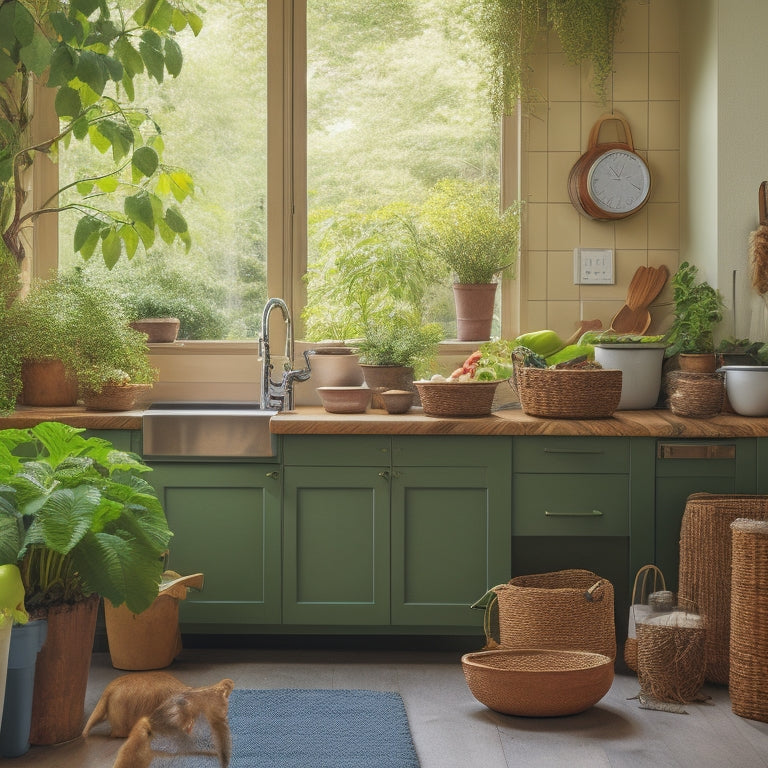
Sustainable Living: Waste Reduction Made Simple
Share
You can start reducing waste today by incorporating simple habits into your daily routine, such as swapping paper towels for reusable cloths and ditching single-use plastics for refillable water bottles. Try meal planning to reduce food waste and opt for products with minimal packaging. By making these user-friendly solutions part of your daily habits, you'll be on your way to a waste-free home, reducing your carbon footprint and saving money. And that's just the beginning - every small step you take will have a significant impact, so what's next?
Key Takeaways
• Swap paper towels for reusable cloths and ditch single-use plastics for refillable water bottles to reduce daily waste generation.
• Adopt meal planning to reduce food waste, and opt for products with minimal packaging to minimize waste accumulation.
• Make composting a habit to turn food waste into nutrient-rich soil, reducing carbon footprint and saving money on fertilizers.
• Incorporate eco-friendly practices into daily routines, such as using refillable bags and choosing sustainable products with minimal waste.
• Start small by making a few changes a week, and track progress to stay motivated and committed to reducing waste.
Simple Steps to Reduce Waste
By implementing a few simple changes to your daily routine, you can greatly reduce the amount of waste you produce at home. Start with quick waste reduction strategies that are easy to incorporate into your daily life.
For instance, swap paper towels for reusable cloths, and ditch single-use plastics for refillable water bottles. User-friendly solutions like these can make a significant impact when combined with small changes to your daily habits.
Try meal planning to reduce food waste, and opt for products with minimal packaging. These simple tweaks can add up to make a big difference in reducing waste at home. By making these changes, you'll be well on your way to a more sustainable lifestyle.
The Benefits of a Waste-Free Home
You'll be surprised at the significant positive impact a waste-free home can have on your daily life and the environment. By adopting a zero waste lifestyle, you'll reduce your carbon footprint, save money, and even free up some extra space in your home.
Imagine the satisfaction of knowing you're doing your part to protect the planet! With eco-friendly cleaning products and a few simple changes to your daily habits, you can make a real difference. Plus, you'll be amazed at how much more organized and peaceful your home will feel without all the clutter and waste.
Waste Reduction by the Numbers
Minimizing waste is an essential step towards a sustainable future, and understanding the staggering statistics behind waste generation is crucial to making a significant impact.
You might be shocked to learn that global annual municipal solid waste generation exceeds 2.01 billion tonnes, with projections reaching 3.40 billion tonnes by 2050. That's a whole lot of trash!
Additionally, did you know that over 90% of waste in recycling bins globally ends up in landfills? It's time to rethink our waste disposal methods.
By adopting sustainable practices, you can be part of the solution. Start by reducing your personal waste output, and then explore alternative waste disposal methods that prioritize recycling and natural remediation.
Every small step counts, and together, we can make a significant difference in the fight against waste.
Managing Food Waste Effectively
As you work to reduce your personal waste output, it's time to tackle one of the most significant contributors to landfill waste: food waste.
You're probably thinking, 'What's the big deal about food waste?' Well, here's the deal: food waste decomposition in landfills produces methane gas, a potent greenhouse gas.
The good news is that you can make a difference by composting. Composting benefits include reducing your carbon footprint, creating nutrient-rich soil, and even saving you money on fertilizer.
By managing food waste effectively, you'll not only reduce waste but also create a more sustainable future. Start by designating a compost bin, adding food scraps, and watching your waste shrink.
With these simple steps, you'll be reducing your food waste impact in no time!
Building a Sustainable Future
By adopting a few simple habits, you can greatly contribute to building a sustainable future, one that's free from the devastating impact of waste and pollution.
A waste-free lifestyle is achievable by incorporating eco-friendly practices into your daily routine. Start by reducing your use of single-use plastics, recycling more, and composting food waste.
You can also make a significant impact by choosing sustainable products, reducing energy consumption, and conserving water.
Remember, every small change you make adds up to make a big difference. By working together, we can create a sustainable future for ourselves and future generations.
Frequently Asked Questions
Can I Still Reduce Waste if I Live in a Small Apartment?
You're wondering if you can reduce waste in your tiny apartment? Absolutely! Space-saving strategies and urban minimalism are your new BFFs.
Start by decluttering, then implement clever storage solutions. Choose multi-purpose items, and get creative with repurposing.
You can even compost with indoor gardening or vermicomposting. Don't let limited space hold you back - every small change adds up to make a big impact!
How Do I Convince My Family to Adopt Sustainable Habits?
Are you tired of being the only eco-warrior in your household? Convincing your family to adopt sustainable habits can be a challenge, but it's worth the effort!
Start by understanding your family dynamics and identifying areas where you can exert personal influence. Lead by example, share your knowledge, and make it fun!
Involve them in decision-making and celebrate small victories together. Remember, every small step counts, and with time, your family will be joining you on the path to a greener future.
Are There Any Affordable Alternatives to Eco-Friendly Products?
You're wondering if going green has to break the bank? Relax, you don't need to sacrifice your savings for sustainability! Look for budget-friendly swaps, like switching to reusable bags and water bottles, or opting for refillable containers.
Frugal living and eco-friendliness can go hand-in-hand. Start with small changes, like DIY cleaning products or buying in bulk, and watch your wallet and the planet thank you.
Can I Compost if I Don't Have a Backyard or Outdoor Space?
You're itching to compost, but your lack of outdoor space has you feeling stuck. Fear not, urban dweller! You can still join the composting crew without a backyard. Indoor vermicomposting is your solution - it's like having a tiny, worm-filled apartment for your food scraps.
Look into compact composting alternatives, like under-sink systems or balcony bins. You'll be turning trash into treasure in no time, and your indoor space will thank you!
Will Reducing Waste Really Make a Significant Impact on the Environment?
You're wondering if reducing waste will really make a dent in the environmental impact? The answer is a resounding 'yes!'
Every small action you take adds up, and collectively, we can mitigate global consequences.
Think about it: if everyone reduced waste by just a little, we'd be looking at a significant decrease in landfill waste, greenhouse gas emissions, and pollution.
Related Posts
-

10 Essential Digital Tools for Small Space Living
You're looking to maximize your digital tools to minimize clutter and streamline your small space living. Start by ut...
